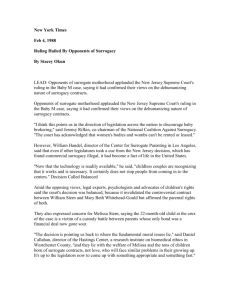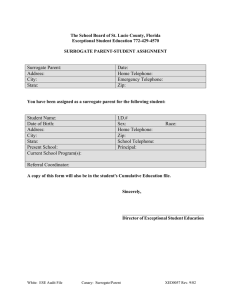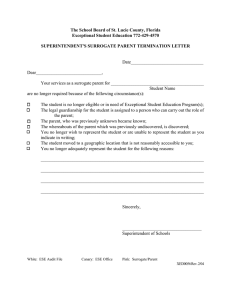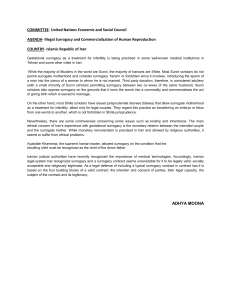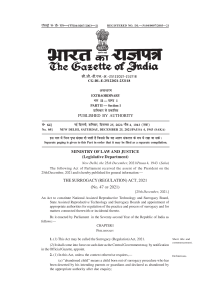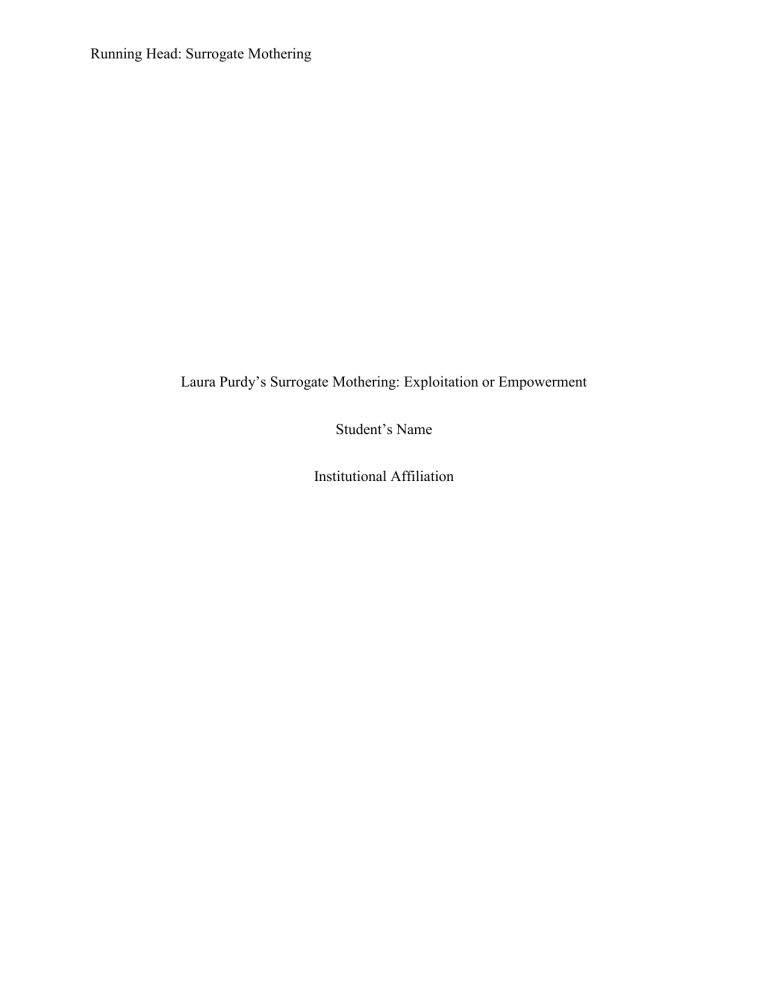
Running Head: Surrogate Mothering Laura Purdy’s Surrogate Mothering: Exploitation or Empowerment Student’s Name Institutional Affiliation 2 Surrogate Mothering Summary The moral framework of surrogate mothering is addressed through the ethical theory that analyzes the rightness of its social aspects, based on the consequences. Pundits of surrogacy contend that the risk and weight of pregnancy are moved to another woman. It causes the separation of reproduction from sex and childbearing. However, these acts are not considered necessarily wrong, either ethically for women or society's fundamental benefits. The practice of surrogacy can be manifested immoral if the women are forced into these training and penalizing agreements. Whereas, reproductive labor possibly enables women to stand high in the society by providing employment that prevails less risk and financial independence. The reproductive innovations are a moderately new phenomenon and its accessibility has expanded considerably in the last decade. This article challenges the perceptions of feminists and analyzes the underlying effects relative to surrogacy. It has been claimed that there are certain benefits of adapting to the surrogacy technique as it shares the burden of the pregnancy with another woman. The problems related to conception in high-risk females can be overwhelmed by giving the responsibility of childbearing to the women, who are less probably to be affected. Moreover, it argues that the level of genetic diseases and infertility can be brought to a minimum level by hiring a surrogate mother. Besides, there is a concept that non-traditional families, including a gay couple, can start a healthy life. It has been also argued that surrogacy accompanies the exploitation of women, as it serves as the source of revenue for the women willing to bear the pain of pregnancy. This act of surrogacy has taken the term "baby-selling"; as it claims that it's the right of the surrogate mother to be compensated for holding the baby for a complete nine months. It indicated that the right has been given to the women to utilize their bodies in the way they want, to nourish a child either for herself or for others. (Bromfield & Rotabi, 2014) 3 Surrogate Mothering In several ways, I disagree with the hidden concept of “her body, my baby”. However, the arguments presented in the current article could have been more convincing, if ethical values were considered deliberately. The article mainly focused on the conventional method of surrogacy, involving the fertilization between the egg of surrogate mother and the sperm of another man. This process of baby development not only crosses the limits of ethical codes but also produces a baby having no legal rights. In this era of technology, a new method of gestational surrogacy has been introduced that implies the in-vitro fertilization. It utilizes the surrogate mother just as host, instead of being a biological parent to the infant. Moreover, I would stand against the argument of preventing the genetic spread of disease, as there are chances that surrogate mothers might be suffering from life-threatening diseases. In addition, the state of being emotional towards the baby would be less as compared to the one undergoing the natural process of pregnancy. I would argue on the statement given at the baby-selling, as it will become the direct and illegal way to earn money. Some people might be running it as a business to generate revenues on a larger scale, especially in the under-developed countries. The major concern lies in ethical values, which can be completely exploited by surrogate mothers as they violate the traditional customs of family development. Connecting to the point of non-traditional families presented in the article, I believe that it diminishes the concept of the traditional and cultural family unit. Moreover, it is not being practiced in many countries due to many religious and cultural norms, considering it as a major sin. Although, surrogacy justifies the need for infertile parents but anything produced against the laws of nature can tend to have a harmful impact. Thus, the surrogacy has increased the complexities and inequalities among the people around the globe. 4 Surrogate Mothering References Bromfield, N. F., & Rotabi, K. S. (2014). Global Surrogacy, Exploitation, Human Rights and International Private Law: A Pragmatic Stance and Policy Recommendations. Global Social Welfare, 123-135. Retrieved from https://link.springer.com/article/10.1007/s40609014-0019-4
